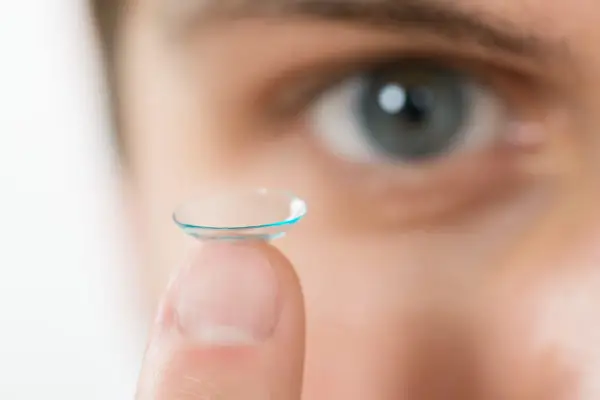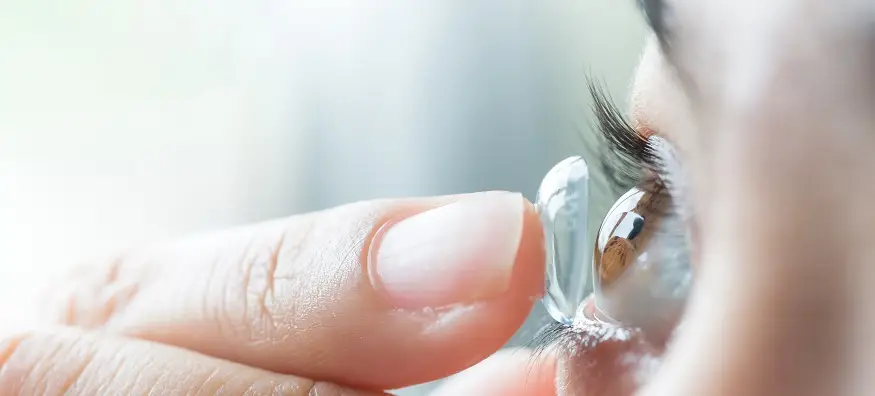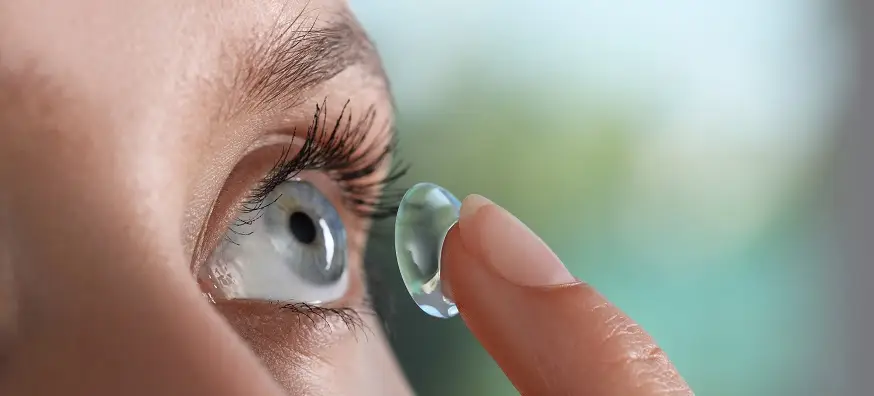Imagine a world where you experience crystal-clear vision without the confines of frames. A world where your appearance remains unchanged, and there’s no hindrance, whether you’re jogging, dancing, or simply enjoying a rainy day. Sounds ideal? That’s the allure of contact lenses. However, like all good things, they come with their set of pros and cons. If you’ve been pondering the switch or just curious about these tiny marvels, you’re in the right place. Dive with us into the fascinating world of contact lenses, understanding their benefits and the risks to heed. Let’s unravel the clarity that awaits you!
Contents
Why Choose Contact Lenses?
Navigating the world of vision correction can seem like a daunting journey, especially with the myriad of choices available. So, what makes contact lenses a preferred option for many?
- Comfort: Once you get accustomed to them, contact lenses can offer an unparalleled level of comfort. Unlike glasses, which might slip down your nose or press against your temples, contacts sit directly on your eyes, becoming an almost invisible part of you.
- Aesthetics: Let’s be honest, not everyone likes how they look in glasses. Contacts provide a solution that doesn’t alter your appearance. They offer a chance to see the world without the barrier of frames, making your face the first thing people notice about you.
- Convenience: Ever faced the annoyance of foggy glasses during a humid day or when sipping a hot drink? Or the challenge of wearing sunglasses over your prescription glasses? Contact lenses eliminate these inconveniences. They also make activities like sports, workouts, and dancing more enjoyable as there’s no risk of glasses falling off or getting in the way.
- Broader Field of Vision: Glasses can restrict your peripheral vision due to the limitations of the frames and lenses. Contact lenses move with your eyes, providing a natural and wide field of view. No more turning your head for a complete side view!
- Flexibility: Want to flaunt a new eye color for a special event? There are colored contact lenses for that! The flexibility to change styles and looks is something glasses usually can’t match.
In essence, contact lenses provide a seamless, natural-feeling solution for vision correction. They integrate with your lifestyle, ensuring that nothing holds you back from experiencing life in its full vibrancy and detail.
Advantages of Embracing Contacts

Contact lenses have rapidly evolved over the years, making them a popular choice for vision correction. Their myriad advantages cater to a wide range of needs, ensuring that there’s something for everyone. Let’s delve into the multifaceted benefits of contact lenses:
Improved Peripheral Vision
Unlike glasses, which can limit side vision because of the frames, contact lenses cover the entire cornea. This provides an unobstructed, all-around view, ensuring you catch those essential peripheral details.
Flexibility in Physical Activities
Whether you’re hitting the gym, diving into a pool, or playing a sport, contact lenses stay in place. No more adjusting slipping glasses during a workout or fearing they might fall off during a basketball game.
Diverse Options to Choose From
Depending on your lifestyle and comfort, you can opt for:
- Daily Lenses: Best for those who prefer the hygiene of a fresh pair every day.
- Weekly or Monthly Lenses: Suitable for those who are looking for a balance between convenience and cost-effectiveness.
- Extended Wear Lenses: Some of these can even be worn overnight, though it’s crucial to follow your optometrist’s advice.
Fashion and Aesthetics
Fancy a change in eye color or want to make a bold fashion statement? Colored contacts have you covered. With a plethora of shades available, you can switch up your look whenever you wish.
No External Weather Effects
Contacts remain unaffected by external weather conditions. No more wiping off raindrops during a drizzle or waiting for your glasses to defog in winter.
Compatibility with Sunglasses
With contacts, you can wear any sunglasses you like, without the need for a prescription version or clip-ons.
Reduced Spectacle Glare
In certain light conditions, glasses can produce reflections that might be distracting. With contacts, this glare is eliminated, offering clearer vision in situations like nighttime driving.
Natural Field of View
Contact lenses move with your eyes, ensuring that objects appear at their natural size and aren’t distorted or minimized as can sometimes happen with high prescription glasses.
In sum, the beauty of contact lenses lies in their adaptability. They offer a solution tailored to various needs and lifestyles, ensuring that every day is seen in its best light.
Potential Risks: What to Look Out For

While contact lenses offer an array of benefits, they are not without potential risks. To ensure that your contact lens experience is both comfortable and safe, it’s essential to be aware of these risks and take necessary precautions.
Infections
One of the primary concerns with contact lens wear is the risk of eye infections, with bacterial infections being the most common. These infections can result from improper lens handling, extended wear, or using expired or contaminated lens solutions.
Corneal Abrasions
Mishandling the lens during insertion or removal, or even wearing a damaged lens, can cause small scratches on the cornea. These abrasions can make the eye more susceptible to infections.
Eye Dryness
Some individuals may experience reduced tear production when wearing contact lenses, leading to eye dryness, discomfort, and redness. It’s essential to use lubricating eye drops recommended by your optometrist in such cases.
Reduced Oxygen Supply
Extended wear lenses, if worn longer than recommended, can reduce the amount of oxygen reaching the cornea. This can cause complications like corneal neovascularization, where blood vessels grow into the cornea.
Allergic Reactions
Some might be allergic to the lens material or the solutions used for cleaning and storing them. This can lead to redness, itching, and discomfort.
Protein Deposits
Over time, protein from tears can accumulate on contact lenses, reducing clarity and sometimes causing discomfort.
The Importance of Proper Care and Maintenance
 Contact lenses, while offering unparalleled convenience and visual clarity, require a dedicated regimen of care and maintenance. Therefore, ensuring their cleanliness is not just about ensuring clarity in vision but is also pivotal in preventing possible eye infections or complications.
Contact lenses, while offering unparalleled convenience and visual clarity, require a dedicated regimen of care and maintenance. Therefore, ensuring their cleanliness is not just about ensuring clarity in vision but is also pivotal in preventing possible eye infections or complications.
- Regular Cleaning: Even if you wear daily disposable lenses, it’s essential to clean them before insertion. For those with extended wear lenses, cleaning should be done both before putting them on and after taking them off. Use the lens solution prescribed by your optometrist to gently rub the lens in your palm, removing minute debris and protein deposits.
- Use Fresh Solution Daily: Never reuse old solutions in your lens case. Ensure you use fresh lens solution every time you store your lenses. This not only cleans your lenses but also disinfects them.
- Avoid Water Contact: Whether it’s tap water, shower, or a swimming pool, keep your lenses away from direct water contact. Water can introduce harmful microorganisms to your lenses, which can lead to severe infections.
- Storing Lenses Properly: When not in use, always store your lenses in their case, fully submerged in lens solution. This keeps them hydrated and free from contaminants.
- Regular Case Maintenance: Your lens case, if not cleaned regularly, can be a breeding ground for bacteria. Rinse it with lens solution (not water), wipe it with a clean tissue, and let it air dry every day. It’s also advisable to replace your lens case at least every three months.
- Avoid Sleeping in Lenses: Unless you’ve been prescribed lenses specifically designed for overnight wear, sleeping with your contacts can deprive your corneas of oxygen, increasing the risk of infections.
- Understand Your Lens Type: Always be aware of the lifespan of your lenses, whether they’re daily, bi-weekly, or monthly. Using lenses beyond their recommended duration can compromise their quality and safety.
- Follow-up Visits: Regular check-ins with your optometrist can ensure you’re following the right care routine and also help in early detection of any potential problems.
In essence, while contact lenses offer a liberating experience from the confines of eyeglasses, they demand a certain level of responsibility. Just a few minutes dedicated to their care daily can ensure a comfortable and safe lens-wearing experience. Always remember, the clearer the lens, the brighter the world!
Conclusion
Embracing the freedom and flexibility that contact lenses offer can be life-changing for many. They provide an unobstructed view of the world, unhindered by frames, and allow for a wider range of activities with ease. Yet, as with any eye-related product, understanding the associated benefits and risks is vital. Prioritizing proper care and hygiene practices can go a long way in ensuring your eyes remain safe and healthy. After all, our vision is among our most treasured senses, and it deserves the utmost care and attention.
If you ever feel a twinge of uncertainty or have questions about your eye health, remember, help is just a call away. Are your eyes craving attention? It’s time to prioritize your eye health! Book your free appointment now at Best Eye Hospital in India or call us on 9711116605. Your vision is our priority!



